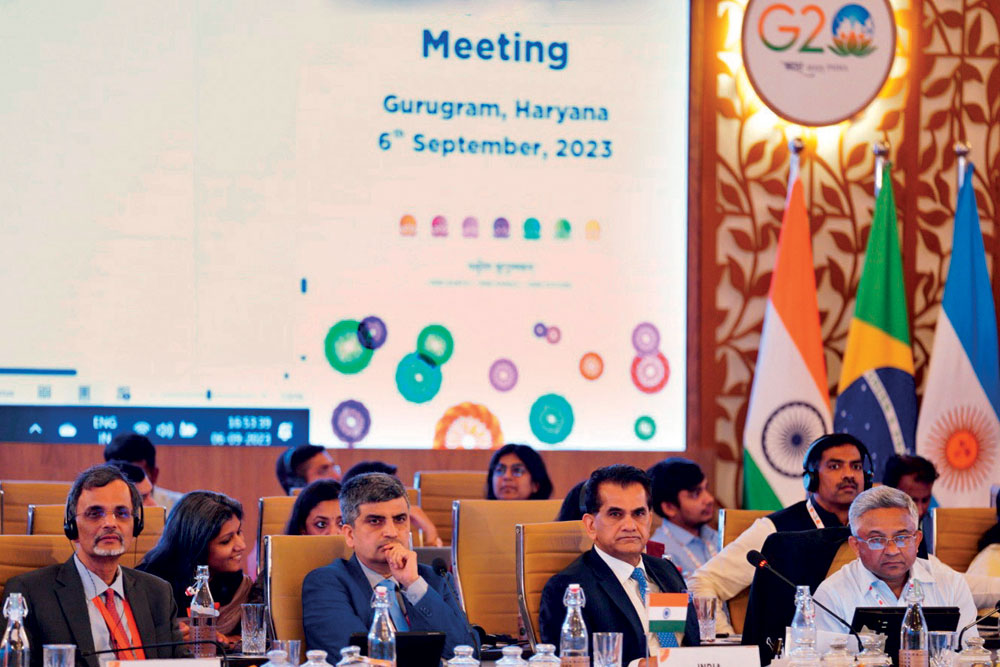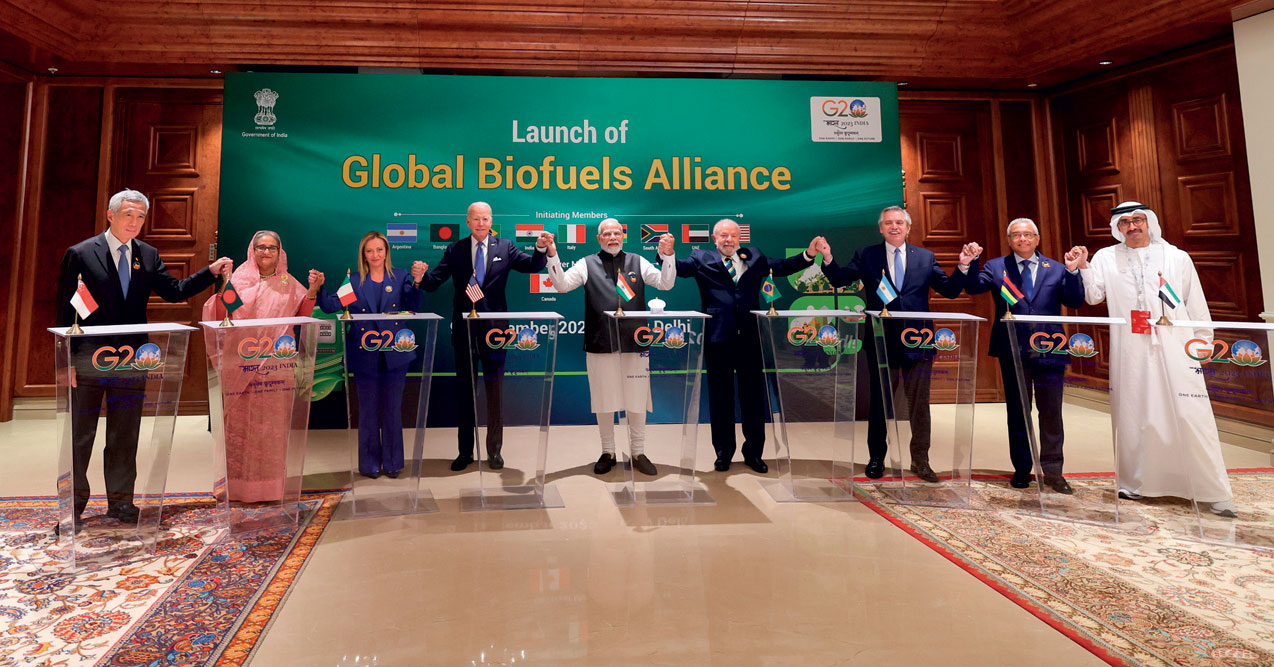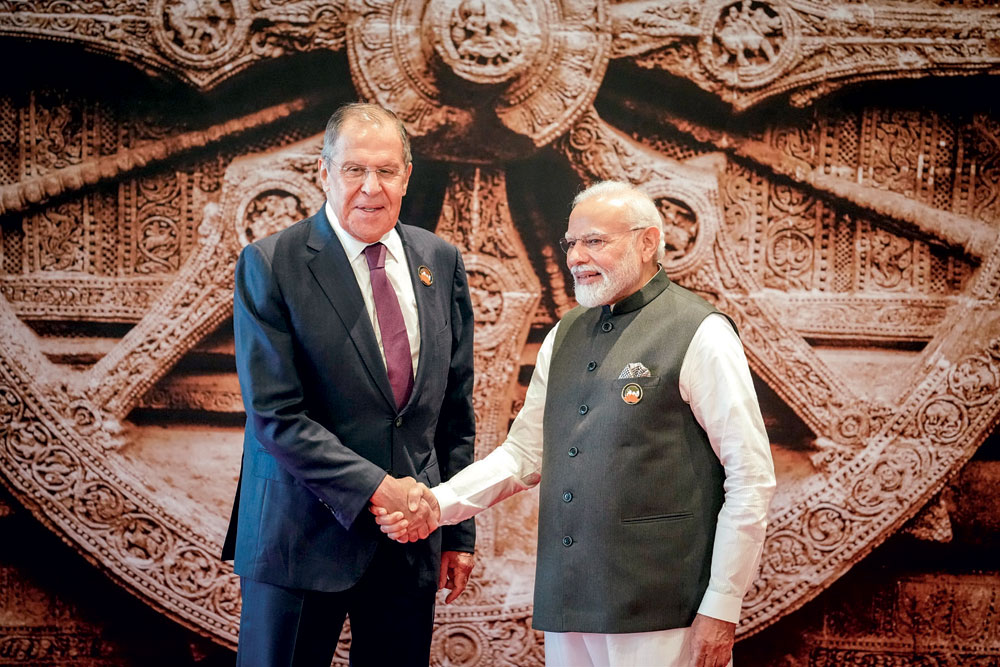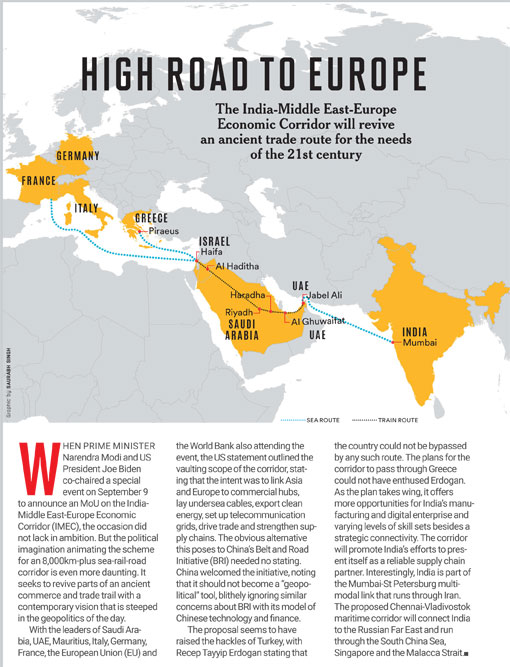The Message
The summit demonstrated India’s ability to influence outcomes on the global stage by bridging geopolitical divides and making the group more economically inclusive
 Rajeev Deshpande
Rajeev Deshpande
 Rajeev Deshpande
Rajeev Deshpande
 |
15 Sep, 2023
|
15 Sep, 2023
/wp-content/uploads/2023/09/Themessage1.jpg)
G20 leaders at Mahatma Gandhi’s memorial at Raj Ghat in New Delhi, September 10, 2023 (Photo: PIB)
A FORTUITOUS TURN of events that saw India swapping its presidency of G20 first with Italy in 2021 and then with Indonesia in 2022 resulted in New Delhi heading the influential grouping at a time when it was uniquely placed to influence its agenda and forge an unlikely consensus amid deepening global conflict. The G 20 ‘troika’ comprising the nation preceding the current presidency, the incumbent, and the succeeding one have a key voice in fashioning outcomes. As it happened, India worked with like-minded Indonesia (India had helped frame the Ukraine clause in Bali in 2022) and Brazil and other ‘middle’ economies with shared interests to draft the geopolitical passages in the 83-paragraph G20 Leaders’ New Delhi Declaration that seemed a bridge too far even as foreign dignitaries began to arrive in the city last weekend. Yet, the G20 grouping that has largely been guided by G7 in its intent, actions and worldview since its inception in 1999 stood on the brink of significant change.
That moment arrived when Prime Minister Narendra Modi announced on the afternoon of September 9 that a consensus had been concluded on the summit declaration. Modi did not hide his satisfaction even as the Indian delegation and other attendees broke out in applause. The cleft between Russia and China, the new G2, and the US and the rest of the West, had after all been a constant backdrop to India’s presidency right since the first meeting of G20 sherpas in Udaipur last December. It had been evident from the start that the Bali declaration’s specific mention of Russia as the aggressor against Ukraine was not going to be repeated in the New Delhi text. The toughening of the Russian position, with China backing it up, within weeks of the Bali statement left no room for doubt. Given the West’s anger against Russian leader Vladimir Putin and its active military support to Ukraine, it did not seem likely that Western nations would accept a diluted reference to Moscow either. But diplomacy is often about finding a middle ground between seemingly irreconcilable positions. And Ukraine will not be the first country to feel hard done by the ebb and flow of global politics. External Affairs Minister S Jaishankar put it pithily while responding to a query on the absence of any mention of Russia when he said, “[As] to the comparison with the Bali declaration… I would only say Bali was Bali and New Delhi is New Delhi.” It was as succinct an exposition of realpolitik as could be possible. A lot can happen in a year.

The New Delhi outcome was not a complete surprise though. There were more than a few straws in the wind. Speaking to the media days before the summit, US National Security Advisor (NSA) Jake Sullivan, asked about the Chinese role during India’s presidency, said it was up to Beijing to decide whether it wanted to play spoiler. “As far as the question of tensions between India and China affecting the [G20] summit… really that’s up to China. If China wants to come in and play the role of spoiler, of course, that option is available to them.” It was a clear signal that the US and by implication most other G20 members would work with the host and that Washington did not want India to suffer an embarrassment. If China’s carping over the use of Vasudhaiva Kutumbakam (the world is one family) and other attempts to undermine India’s presidency were carried too far, it would leave the communist giant deeply isolated. It may not even have been able to count on Middle Eastern nations it has been courting assiduously through investments and other blandishments.
A favourable G20 troika was not the only factor working in India’s favour. The winds of global politics aided India’s cause. Its membership of various forums, including ones like the Shanghai Cooperation Organisation (SCO) where both Pakistan and China are present, BRICS (Brazil, Russia, India, China, South Africa), the Quad (the US, Japan, Australia, India), and I2U2 (India, Israel, US, UAE), provides a unique cross-cutting presence. As the rifts over the war in Ukraine deepened, India remained one of the few nations with a direct line to Moscow which proved crucial in getting Putin to agree to several references that he might have had reservations about in lieu of altering the directly critical comments in the Bali text. The New Delhi declaration strongly backs the Black Sea grain and fertiliser deal that Russia has been sabotaging and calls on combatants not to attack relevant infrastructure. In the context of the Ukraine conflict, it notes that “all states” must refrain from the threat or use of force to seek territorial acquisition. The call for a just and durable peace may be differently interpreted by Moscow, but it is plain enough that G20 did not endorse or approve Russia’s actions. Paragraphs 7 to 14 very much reflect India’s position opposing violation of the UN Charter and territorial integrity of Ukraine without explicitly naming Russia.
The reluctance of G7 nations in handing Russia and China a major diplomatic win, if the New Delhi summit ended in failure, is seen as a factor that prodded the West to accept India’s proposals on the declaration. But such an outcome may not have been in Russia’s interests either. The backlash in India would have been furious if Moscow was seen as the stumbling block, hurting a nation that is already a pariah state. And for all its “no limits” partnership with China, it would not be in Russia’s interests either if Beijing faced fewer checks and balances despite their shared animus towards the West. Russia has a long history in dealing with China and is not unaware of its instinct to dominate and dictate, particularly evident under Xi Jinping. Russia has no incentive to injure its relations with India which, despite a certain diminution, span important sectors like energy and defence. India’s purchase of discounted Russian oil has worked to the benefit of both countries.

If the stellar constellations appeared propitiously placed, India worked hard to leverage its equities with developing nations even as it sought to influence G7 to its ends. “One of India’s priorities when it took over was articulating the concerns of the Global South. India took their views on board and did so through genuine and sustained dialogue. Their issues of debt relief and global inflation were heard as part of a structured consultation. Prime Minister Narendra Modi’s letter to G20 members seeking the African Union’s (AU) admittance as a permanent member was intended to make the grouping a genuine round table and not just a cosy club where G7 framed the discussion,” Vikas Swarup, former Indian high commissioner to Canada, told Open. The invite to AU was not a gimmick but a purposeful response to the deep distress many nations in the continent are facing in the wake of the inflation in wheat and energy prices due to the war in Ukraine along with the devastating impact of climate change causing repeated droughts, destroying crops, livestock, wildlife and human livelihoods. The promise to re-imagine the functioning of Multilateral Development Banks (MDB) and expand finance for climate change does not add up to an executive decision. The complex changes have to be carried out by organisations like the World Bank where the role of the US is critical. But while the translation of G20 pledges into actual action is a challenge, the norm-setting is nevertheless important. “[W]e call on the MDBs to undertake comprehensive efforts to evolve their vision, incentive structures, operational approaches and financial capacities so that they are better equipped to maximize their impact in addressing a wide range of global challenges while being consistent with their mandate and commitment to accelerate progress towards Sustainable Development Goals (SDGs),” states the declaration. There are in fact several paragraphs on MDBs calling for newer hybrid finance and a greater say for developing nations in prescriptions to combat poverty and debt.
The consensus document was no doubt the result of India’s extensive diplomatic engagement with all G20 nations at a bilateral level and its position as a growing economy in a world beset with uncertainties. There was indeed something for everyone
The flawless organisation of the summit itself and the grand dimensions of the newly inaugurated Bharat Mandapam at Delhi’s Pragati Maidan were an achievement in themselves involving a logistical feat and technology-enhanced security measures. While the summit served to showcase India’s successes in providing digital public goods and burnished its reputation as a rising power, it is useful to evaluate what the G20 presidency meant for the country’s more consequential relationships. The consolidation and expansion of India-US ties during Modi’s state visit to the US in June provided an early indicator of the cooperation Washington extended in bringing about a consensus declaration. Though a shared concern over China’s rise animates India-US ties, there is a larger investment in a partnership that both feel is important for the world order they are invested in, even as India displays its strategic autonomy as it did with regard to Ukraine. The dysfunctionality of the UN Security Council (UNSC) and the stalemate within the P5 provide India room to leverage its equations with the US and also utilise commonalities with middle economies in G20 to its advantage. The summit ended with a strong reiteration of India-US ties. The India-Russia relationship, too, has sustained with Putin continuing to see Modi as a friend even if not an ally. The bridge that India provides him is important for Russia although this may involve a wink or two as India has made it amply clear that the war in Ukraine could not have happened at a worse time when the world was just about emerging from the shadow of Covid. But as Modi’s hearty handshake with Russian Foreign Minister Sergey Lavrov showed, the successful adoption of the geopolitical paragraphs meant a lot to both nations and Moscow possibly appreciates the safe passage it got in a hostile gathering.

BARRING THE YEAR when Covid held the world in its deadly grip, Chinese president Xi Jinping has not skipped any G20 summit. His absence at the New Delhi meet was interpreted as a reflection of the poor state of India-China relations as also a desire to take the sheen off India’s show. The preparedness of Western nations to step back from the Bali formulation and Russia agreeing to the amended text did not leave China much to object to. In hindsight, Xi might have an added reason to skip the summit. He would have almost certainly had to face questions on supporting the Russian invasion of Ukraine in bilateral contacts that could not have been avoided. In a world obsessed with balance-of-power scenarios, India’s projection as the ‘voice’ of the Global South inevitably challenges China’s positioning on this score. This is despite China’s lead in its outreach to this segment powered by the massive lending capacities of its state-run companies and banks. China’s outbound FDI in 2022 is estimated at $140 billion which is an increase over previous years and is despite the slowdown of its own economy. India’s increased engagements with the Quad, which China calls an Asian NATO, the I2U2 partnership, and now the India-Middle East-Europe Economic Corridor, are unambiguously alternatives to a China-led order. The strategic implications of the ‘non-traditional’ pathways cannot be missed. “Connectivity is as important as defence equipment. We have seen how vaccines and finance have been securitised. So India’s choices have a strategic dimension that both sides are aware of,” a former Indian diplomat who has served in the UN said. There are no upsides in the India-China relationship. Rather, India’s success and gain in stature sits poorly with Beijing that has concluded its southern neighbour is getting too big for its boots and needs a rap or two on the knuckles. As India continues to develop options that will make the terms of engagement with China more even, the jostling is likely to intensify. Commentators who harp on the need for India to improve ties with China fail to consider the need for reciprocity and the changed political temper in Delhi. China did all it could to undercut India and the summit’s success was a resounding setback for Beijing.
Russia has no incentive to injure its relations with India which, despite a certain diminution, span important sectors like energy and defence. India’s purchase of discounted Russian oil has worked to the benefit of both countries
The Delhi declaration is an unusual instance where countries with sharply conflicting views have declared their satisfaction with the results. The consensus document was no doubt also the result of India’s extensive diplomatic engagement with all G20 nations at a bilateral level and its position as a growing economy in a world beset with uncertainties. There was indeed something for everyone. The restructuring of international finance and MDBs suggested by emerging economies has some benefits for the US and other Western economies. The hybrid or blended finance options can allow them to retain a major say in these institutions while encouraging borrowing nations to leverage the lending to raise private finance. Projects like the Middle East corridor provide the US with an avenue to remain engaged in a region where it has sought to contain its footprint. Countries like India can deliver the technology and human resources needed for project implementation. The scheme provides smaller Gulf nations a salience and a larger country like Saudi Arabia an opportunity to be seen as setting the agenda in the region. Navigating the world, Jaishankar said in a recent media interaction, requires a sharper awareness of how it works. In the run-up to the Delhi summit, India’s diplomats astutely recognised that nations like Indonesia, Saudi Arabia, Brazil, and even South Korea, despite unease over Russia’s overtures to North Korea, are invested in the Indian partnership. There was, in the end, sufficient support for a position that did not accept the maximalist line advocated by Western nations ahead of the summit.

The long hours spent in fashioning the phrases and formulations that finally found acceptance were backed with an ultimatum of sorts, with Indian negotiators making plain the boundaries set for them by Modi. This meant negotiations did not stretch on endlessly, turning crisis management into the main news of the day. The anti-climactic denouement well before the summit concluded strikingly underlined India’s emergence on the big stage and Modi’s ability to leverage its strengths.
About The Author
MOst Popular
3

/wp-content/uploads/2025/07/Cover-Shubman-Gill-1.jpg)












More Columns
Trump’s Disruption of World Trade Krishnan Srinivasan
Author Thomas Suárez presents peace framework for the Palestine-Israel crisis Ullekh NP
Shubhanshu Shukla Returns to Earth Open